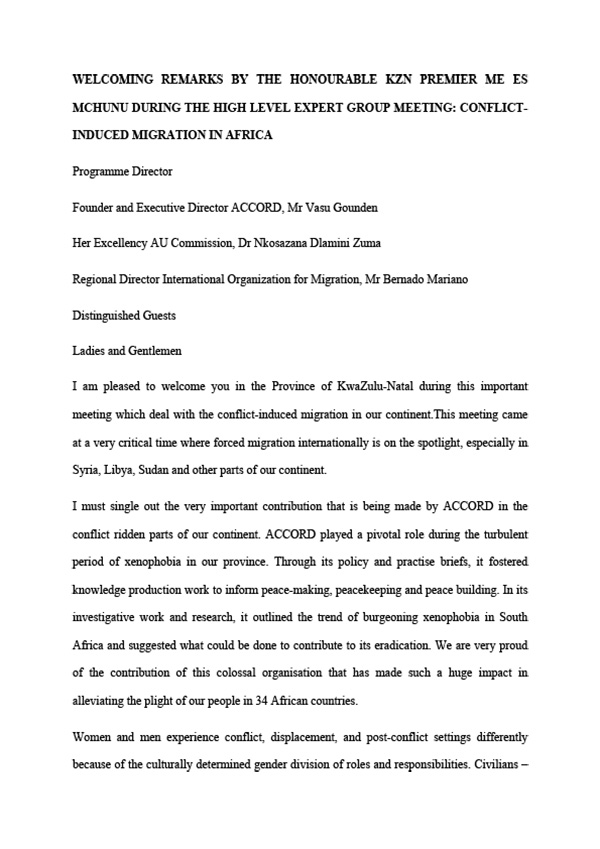
Welcoming remarks by the honourable KZN Premier Mr. ES Mchunu during the high level expert group meeting: Conflict-inducted migration in Africa
Programme Director
Founder and Executive Director ACCORD, Mr Vasu Gounden
Her Excellency AU Commission, Dr Nkosazana Dlamini Zuma
Regional Director International Organization for Migration, Mr Bernado Mariano
Distinguished Guests
Ladies and Gentlemen
I am pleased to welcome you in the Province of KwaZulu-Natal during this important meeting which deal with the conflict-induced migration in our continent. This meeting came at a very critical time where forced migration internationally is on the spotlight, especially in Syria, Libya, Sudan and other parts of our continent.
I must single out the very important contribution that is being made by ACCORD in the conflict ridden parts of our continent. ACCORD played a pivotal role during the turbulent period of xenophobia in our province. Through its policy and practise briefs, it fostered knowledge production work to inform peace-making, peacekeeping and peace building. In its investigative work and research, it outlined the trend of burgeoning xenophobia in South Africa and suggested what could be done to contribute to its eradication. We are very proud of the contribution of this colossal organisation that has made such a huge impact in alleviating the plight of our people in 34 African countries.
Women and men experience conflict, displacement, and post-conflict settings differently because of the culturally determined gender division of roles and responsibilities. Civilians – mostly women, children, the elderly, and the disabled – are the main victims of wars, with estimates that they account for between 30–90 per cent of casualties. Women are especially vulnerable in those informal, low-key armed conflicts that are a majority today. Most of the military casualties are young men, although there are a large number of female combatants throughout the continent. Men make up 96 per cent of the detainee population and 90 per cent of the missing, while women and children represent a majority of the displaced. Women and girls are targeted because of their gender. Armed conflict usually exacerbates inequalities, including gender-based ones, although the effects vary depending on particular contexts. Women and girls are particularly vulnerable because of their disadvantaged position in society in general. Women have less access to education and employment opportunities, and are less mobile because of their traditional productive and reproductive roles. This can lead to higher mortality among females during armed conflict, as women and girls are affected by physical and sexual violence, impoverishment, lack of access to basic goods and services, and gender discrimination.
Violent conflict causes millions of people to flee their homes every year. The resulting displacement crises not only create logistical and humanitarian nightmares, these crises threaten international security and risk the lives of displaced people, aid workers, and peacekeepers. Despite the dangers posed by conflict-induced displacement, scholars, policy makers and international organizations usually have only a partial understanding of these crises. Conflict-induced displacement consists of violence that caused the displacement and characteristics of the resulting displacement crisis. Many observers fail to disaggregate each factor; rather lumping all types of violence together or viewing displaced people as an undifferentiated mass.
I am very grateful that this meeting is taking place in our province and in the city of EThekwini which have seen its fair share of conflict induced displacements during the xenophobic violence. I am very hopeful that the deliberation will go a long way to resolving conflicts that have caused so much harm in Africa.
It is my pleasure to extend my warmest welcome to you all in the Province of KwaZulu-Natal.
I thank you
